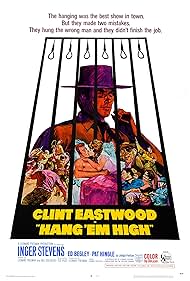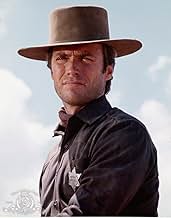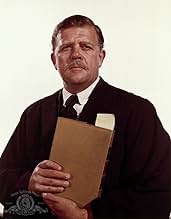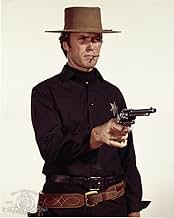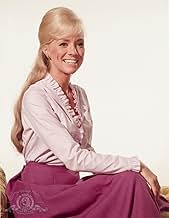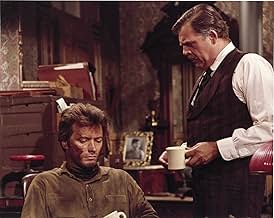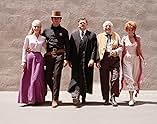When an innocent man barely survives a lynching, he returns as a lawman determined to bring the vigilantes to justice.When an innocent man barely survives a lynching, he returns as a lawman determined to bring the vigilantes to justice.When an innocent man barely survives a lynching, he returns as a lawman determined to bring the vigilantes to justice.
- Director
- Writers
- All cast & crew
- Production, box office & more at IMDbPro
Featured reviews
Big Clint's first film outside of Serigo Leone's sensational Dollars trilogy is none other than...a Western. Hang 'Em High is a rather overlooked entry in Clint's long and impressive film wagon, even though it is a serious, no-nonsense and modest look at crime and punishment and a subtle dig at the injustice system, which was somewhat forgotten by his critics who emphasised that he was a symbol of violence, especially in the Dollars trilogy and the Dirty Harry series.
Clint plays an ex-lawman who picks up a new badge after he is almost killed by a group of men who hang him and leave him for dead. He then embarks on a mission to hunt them down one-by-one and hand them over to the law.
Ted Post's watchable Western drama is definetly a refreshing break from most other 'revenge' movies. Instead of cold-blooded vengence, the script decides to display Clint's character, though still as the cold, silent anti-hero, as a more peaceful person who would truly like to see men behind bars rather than shooting them down. The film also keeps it grip, rarely letting a boring moment crawl in even though this is more talk than action.
Its not a perfect, polished or particularly great film - the characterisation always stays pretty low and the romance between Clint and the charming Inger Stevens isn't fully developed, for instance. However, it has its highlights - a memorable opening sequence and an effective musical score - along with its notable touch for seeing justice rather than violence and killing. A good effort that's worth watching and not ignoring.
Clint plays an ex-lawman who picks up a new badge after he is almost killed by a group of men who hang him and leave him for dead. He then embarks on a mission to hunt them down one-by-one and hand them over to the law.
Ted Post's watchable Western drama is definetly a refreshing break from most other 'revenge' movies. Instead of cold-blooded vengence, the script decides to display Clint's character, though still as the cold, silent anti-hero, as a more peaceful person who would truly like to see men behind bars rather than shooting them down. The film also keeps it grip, rarely letting a boring moment crawl in even though this is more talk than action.
Its not a perfect, polished or particularly great film - the characterisation always stays pretty low and the romance between Clint and the charming Inger Stevens isn't fully developed, for instance. However, it has its highlights - a memorable opening sequence and an effective musical score - along with its notable touch for seeing justice rather than violence and killing. A good effort that's worth watching and not ignoring.
Hang 'Em High is directed by ted Post and written by Leonard Freeman and Mel Goldberg. It stars Clint Eastwood, Inger Stevens, Pat Hingle, Ed Begley, Ben Johnson, Charles McGraw, Ruth White and Bruce Dern. Music is by Dominic Frontiere and cinematography is shared by Richard H. Kline and Leonard J. South.
An innocent man survives a lynching and returns as a lawman and sets about bringing the vigilantes to justice.
After making a name in Leone's Dollars Trilogy, Eastwood returned to America and began cementing his name in the genre of film that would come to define him. Though very much an American Western, this does have Spaghetti Western tonal splinters. Story is derivative and safe, however the characterisations are not and are pungent enough to warrant viewing investment.
Unfortunately director Ted Post often lets the pace sag to unbearable levels - especially in the last third of film, it's a shame that the mooted Robert Aldrich didn't get the gig. There simply is not enough on the page to sustain the near two hour running time, with the finale proving to be a rather flat experience. The liberal stance on the death penalty is a touch heavy handed, but not so as to kill the picture since the thought process of the complexities of justice holds high interest values. Then of course there is Eastwood to lure one in.
He's not the best actor in the film, though the amorality of character he plays makes him the fascinating centre piece. Hingle steals the acting honours as the stoically forthright Judge Fenton, while Stevens also shines as Rachael Warren, a character who like Eastwood's Jed Cooper has an obsessional motive for capturing criminals in her heart. All told the perfs across the board are pitched right and good value.
I'm not sure if the fact two cinematographers were used was a job for mates scenario? Whatever though, for there's nice work here, the New Mexico locations pleasing and at the same time mood compliant for the harsher edges of the story. Frontiers's music is interesting, full of ebullience - sometimes overbearing, it strangely at times sounds familiar to some of Herrmann's compositions in the fantasy genre...
Hang 'Em High is an important entry in the Western genre library, though neither great or bad, it's still a must see for genre enthusiasts. 7/10
An innocent man survives a lynching and returns as a lawman and sets about bringing the vigilantes to justice.
After making a name in Leone's Dollars Trilogy, Eastwood returned to America and began cementing his name in the genre of film that would come to define him. Though very much an American Western, this does have Spaghetti Western tonal splinters. Story is derivative and safe, however the characterisations are not and are pungent enough to warrant viewing investment.
Unfortunately director Ted Post often lets the pace sag to unbearable levels - especially in the last third of film, it's a shame that the mooted Robert Aldrich didn't get the gig. There simply is not enough on the page to sustain the near two hour running time, with the finale proving to be a rather flat experience. The liberal stance on the death penalty is a touch heavy handed, but not so as to kill the picture since the thought process of the complexities of justice holds high interest values. Then of course there is Eastwood to lure one in.
He's not the best actor in the film, though the amorality of character he plays makes him the fascinating centre piece. Hingle steals the acting honours as the stoically forthright Judge Fenton, while Stevens also shines as Rachael Warren, a character who like Eastwood's Jed Cooper has an obsessional motive for capturing criminals in her heart. All told the perfs across the board are pitched right and good value.
I'm not sure if the fact two cinematographers were used was a job for mates scenario? Whatever though, for there's nice work here, the New Mexico locations pleasing and at the same time mood compliant for the harsher edges of the story. Frontiers's music is interesting, full of ebullience - sometimes overbearing, it strangely at times sounds familiar to some of Herrmann's compositions in the fantasy genre...
Hang 'Em High is an important entry in the Western genre library, though neither great or bad, it's still a must see for genre enthusiasts. 7/10
I found this to be a pretty solid western, not one you hear a lot about but a fast- moving film which means it entertains. It doesn't dawdle on any one particular scene.
There is a good cast in this Clint Eastwood-starred movie. Pat Hingle did an outstanding job as the too gung-ho judge but isn't all bad and has an interesting explanation of the situation he was in near the end of the film.
Overall, this a gritty story with Eastwood in his customary revenge-minded role, although he mellows somewhat by the end of the film. I also appreciated all the good facial closeups in here. As with most westerns, the movie is nicely photographed.
This movie had a odd combination of being really raw in parts but yet thoughtful. I think it's a very underrated, under-appreciated western.
There is a good cast in this Clint Eastwood-starred movie. Pat Hingle did an outstanding job as the too gung-ho judge but isn't all bad and has an interesting explanation of the situation he was in near the end of the film.
Overall, this a gritty story with Eastwood in his customary revenge-minded role, although he mellows somewhat by the end of the film. I also appreciated all the good facial closeups in here. As with most westerns, the movie is nicely photographed.
This movie had a odd combination of being really raw in parts but yet thoughtful. I think it's a very underrated, under-appreciated western.
This was Clint Eastwood's American Western debut that I had never really seen all the way through until now. At first I thought it would be another ride 'em high, cowboys n' indians flick that was popular in America those days... before Sergio Leone shook the genre down to its raw and merciless possibilities.
The film was pretty good, and the moral undercurrent of justice "by a dirty rope on the plain, or a judge in a robe standing before the American flag" is rather striking. The Federal judge is by far one of the most interesting characters I have seen yet in a Western.
Indeed, the grittiest and most barbaric scene is not the lynching of an innocent man, but the public hanging on the eve of statehood... to prove that Oklahoma Territory executed the sort of justice required of a "civilized" state of the Union. It is made a public spectacle with beautiful hymns and cold beer. And just the way each of the condemned faces his execution is tongue in cheek.
Then there was the campfire scene where Captain Wilson confers with his employees regarding their options: irony, fear and desperation. They put a human face on their culpability, similiarly echoed decades later by Little Bill's "I don't deserve this, I was building house." And the few who chose not to run chose a desperate and violent option.
A dillemic "no one wins" justice spiralling into graphic violence... and ultimately an undiginified and graceless death. What was perfected into poignant brevity by Unforgiven was born in Hang Em High's exploration of two men's differing approaches to an unforgiving justice... a justice that led either to the end of a noose, or the end of a gun.
Not bad at all...
The film was pretty good, and the moral undercurrent of justice "by a dirty rope on the plain, or a judge in a robe standing before the American flag" is rather striking. The Federal judge is by far one of the most interesting characters I have seen yet in a Western.
Indeed, the grittiest and most barbaric scene is not the lynching of an innocent man, but the public hanging on the eve of statehood... to prove that Oklahoma Territory executed the sort of justice required of a "civilized" state of the Union. It is made a public spectacle with beautiful hymns and cold beer. And just the way each of the condemned faces his execution is tongue in cheek.
Then there was the campfire scene where Captain Wilson confers with his employees regarding their options: irony, fear and desperation. They put a human face on their culpability, similiarly echoed decades later by Little Bill's "I don't deserve this, I was building house." And the few who chose not to run chose a desperate and violent option.
A dillemic "no one wins" justice spiralling into graphic violence... and ultimately an undiginified and graceless death. What was perfected into poignant brevity by Unforgiven was born in Hang Em High's exploration of two men's differing approaches to an unforgiving justice... a justice that led either to the end of a noose, or the end of a gun.
Not bad at all...
"Hang 'Em High" is a fictionalized account of Hangin' Judge Parker's court at Fort Smith, Arkansas. Judge Parker had jurisdiction over a large chunk of Indian Territory (Oklahoma today). The house of ill repute in the film is a fictionalized version of Miss Laura's Social Club which still stands in Fort Smith and has the dubious distinction of being the only whore house on the National Register of Historic Places. In the movie, Fort Smith becomes Fort Grant but a few of the place names used are actual names of towns nearby, such as Alma, Arkansas, and Poteau, Oklahoma. The river in "Hang 'Em High" is too small (even before the locks and dams) to be the Arkansas River but could stand in for the Poteau River; the confluence of the two rivers occurs at Belle Point in Fort Smith. Most of the movie was shot in California and New Mexico (certainly not eastern Oklahoma) but the scenes of the gallows and the judge's court and office look very much like Judge Parker's Court in Fort Smith that is also on the National Register of Historic Places. If not actually filmed there, then the producer and director did an excellent job recreating it as a set. Even the dungeon jail is correct.
This was Clint Eastwood's first American western following his triumph in Sergio Leone's spaghetti western trilogy. Eastwood wanted Leone to direct this one but he was already committed to another project. From what I read neither Eastwood nor director Ted Post worked well with the producer/writer Leonard Freeman.
"Hang 'Em High" starts out with a bang, a lynching that backfires. To show the audience that Jed Cooper (Clint Eastwood) is a good guy, Cooper rescues a calf from drowning. This ploy was later used in "Tombstone" when Wyatt Earp (Kurt Russell), on his first appearance on screen, aids a horse that is being mistreated. Wyatt gives the perpetrator a taste of his own medicine reprimanding him, "Hurts, don't it?" Veteran actor Ben Johnson, who was from Oklahoma, happens on the scene while Cooper is still dangling, cuts him free, then throws him into the "tumbleweed wagon" full of thieves and cut throats bound for Fort Grant and justice. After lingering in the dungeon jail awhile, the judge clears Cooper and makes him a federal Marshall, warning him to bring the nine men in who attempted to hang him, but bring them in alive. The rest of the film deals with Cooper rounding up the nine plus a few other killers along the way. There is also emphasis on the different interpretation of justice by Cooper, a former lawman, and the judge. This leads to several dramatic confrontations. There is a parallel story of a search for justice by Rachel Warren (Inger Stevens)who falls for Cooper and visa versa. They have a thirst for vengeance in common.
Much of the movie is fiction, but parts are based on history. The circus atmosphere that accompanied the public hangings in Fort Smith during Judge Parker's rule is shown basically as it has been reported. There were vendors present, hawking all types of goods and goodies. Children wandered around with or without their parents. The fathers would sometimes place their children on their shoulders so the tads could get a better view of the executions. And there were multiple hangings recorded, similar to the one in the film.
The viewer may enjoy seeing a lot of familiar faces in the cast. Veteran actor Bob Steele plays Old Man Jenkins, a member of the lynching party. Bruce Dern is as ornery as they come. He is not only a member of the lynching party but a cold-blooded killer as well. Alan Hale, Jr. (The Skipper to his Little Buddy), one of the lynching party, is a blacksmith who seems apathetic to the incident. Dennis Hopper has what could be labeled a billed cameo role. The viewer barely sees his face at all. L.Q. Jones is a member of the lynching party turning in his usual fine performance. Charles McGraw plays the sheriff of Red Creek (possibly Garrison Creek, which today is Roland, Oklahoma) who has a back problem--or is it a spine problem? James MacArthur makes a solemn preacher extracting final confessions from the condemned.
Pat Hingle portrays the hanging judge in fairly realistic terms. The real hanging judge never watched the condemned swing. Judge Adam Fenton not only watches but nods to the hangmen when to pull the lever. The masterful Ed Begley is the vicious leader of the lynching party who is determined to make amends for his botched hanging of Cooper by hanging him even higher next time. The lovely and sexy Inger Stevens turns in a winning performance as a supplement to Cooper's vengeance. And Clint Eastwood, well, he's Clint Eastwood. Need I say more?
This was Clint Eastwood's first American western following his triumph in Sergio Leone's spaghetti western trilogy. Eastwood wanted Leone to direct this one but he was already committed to another project. From what I read neither Eastwood nor director Ted Post worked well with the producer/writer Leonard Freeman.
"Hang 'Em High" starts out with a bang, a lynching that backfires. To show the audience that Jed Cooper (Clint Eastwood) is a good guy, Cooper rescues a calf from drowning. This ploy was later used in "Tombstone" when Wyatt Earp (Kurt Russell), on his first appearance on screen, aids a horse that is being mistreated. Wyatt gives the perpetrator a taste of his own medicine reprimanding him, "Hurts, don't it?" Veteran actor Ben Johnson, who was from Oklahoma, happens on the scene while Cooper is still dangling, cuts him free, then throws him into the "tumbleweed wagon" full of thieves and cut throats bound for Fort Grant and justice. After lingering in the dungeon jail awhile, the judge clears Cooper and makes him a federal Marshall, warning him to bring the nine men in who attempted to hang him, but bring them in alive. The rest of the film deals with Cooper rounding up the nine plus a few other killers along the way. There is also emphasis on the different interpretation of justice by Cooper, a former lawman, and the judge. This leads to several dramatic confrontations. There is a parallel story of a search for justice by Rachel Warren (Inger Stevens)who falls for Cooper and visa versa. They have a thirst for vengeance in common.
Much of the movie is fiction, but parts are based on history. The circus atmosphere that accompanied the public hangings in Fort Smith during Judge Parker's rule is shown basically as it has been reported. There were vendors present, hawking all types of goods and goodies. Children wandered around with or without their parents. The fathers would sometimes place their children on their shoulders so the tads could get a better view of the executions. And there were multiple hangings recorded, similar to the one in the film.
The viewer may enjoy seeing a lot of familiar faces in the cast. Veteran actor Bob Steele plays Old Man Jenkins, a member of the lynching party. Bruce Dern is as ornery as they come. He is not only a member of the lynching party but a cold-blooded killer as well. Alan Hale, Jr. (The Skipper to his Little Buddy), one of the lynching party, is a blacksmith who seems apathetic to the incident. Dennis Hopper has what could be labeled a billed cameo role. The viewer barely sees his face at all. L.Q. Jones is a member of the lynching party turning in his usual fine performance. Charles McGraw plays the sheriff of Red Creek (possibly Garrison Creek, which today is Roland, Oklahoma) who has a back problem--or is it a spine problem? James MacArthur makes a solemn preacher extracting final confessions from the condemned.
Pat Hingle portrays the hanging judge in fairly realistic terms. The real hanging judge never watched the condemned swing. Judge Adam Fenton not only watches but nods to the hangmen when to pull the lever. The masterful Ed Begley is the vicious leader of the lynching party who is determined to make amends for his botched hanging of Cooper by hanging him even higher next time. The lovely and sexy Inger Stevens turns in a winning performance as a supplement to Cooper's vengeance. And Clint Eastwood, well, he's Clint Eastwood. Need I say more?
Storyline
Did you know
- TriviaInger Stevens had never heard of Clint Eastwood before she was cast. Once they met she began to like him very much and they ended up having an affair during filming. When the film was finished, Stevens told director Ted Post: "Anytime you do a picture with Clint and there's a part in it, call me."
- GoofsWhen Jed is rescued from the noose, a white vehicle can be seen flashing quickly between the trees in the distance.
- Quotes
Jed Cooper: You don't remember me, do you?
Reno, Cooper Hanging Party: No.
Jed Cooper: [showing his hanging scar] When you hang a man, you better look at him.
- Alternate versionsAs with many westerns at the time the UK cinema version was cut by the BBFC to reduce facial closeups during the opening lynching and to edit Cooper's fight with Miller. Later video/DVD releases were intact.
- ConnectionsFeatured in Legends of the West (1992)
- SoundtracksShall We Gather at the River?
Members of choir and congregation, First Baptist Church, Las Cruces NM
By Robert Lowry
Sung by crowd before mass hanging
Details
Box office
- Budget
- $1,600,000 (estimated)
- Gross US & Canada
- $11,000,000
- Gross worldwide
- $11,000,000
Contribute to this page
Suggest an edit or add missing content

